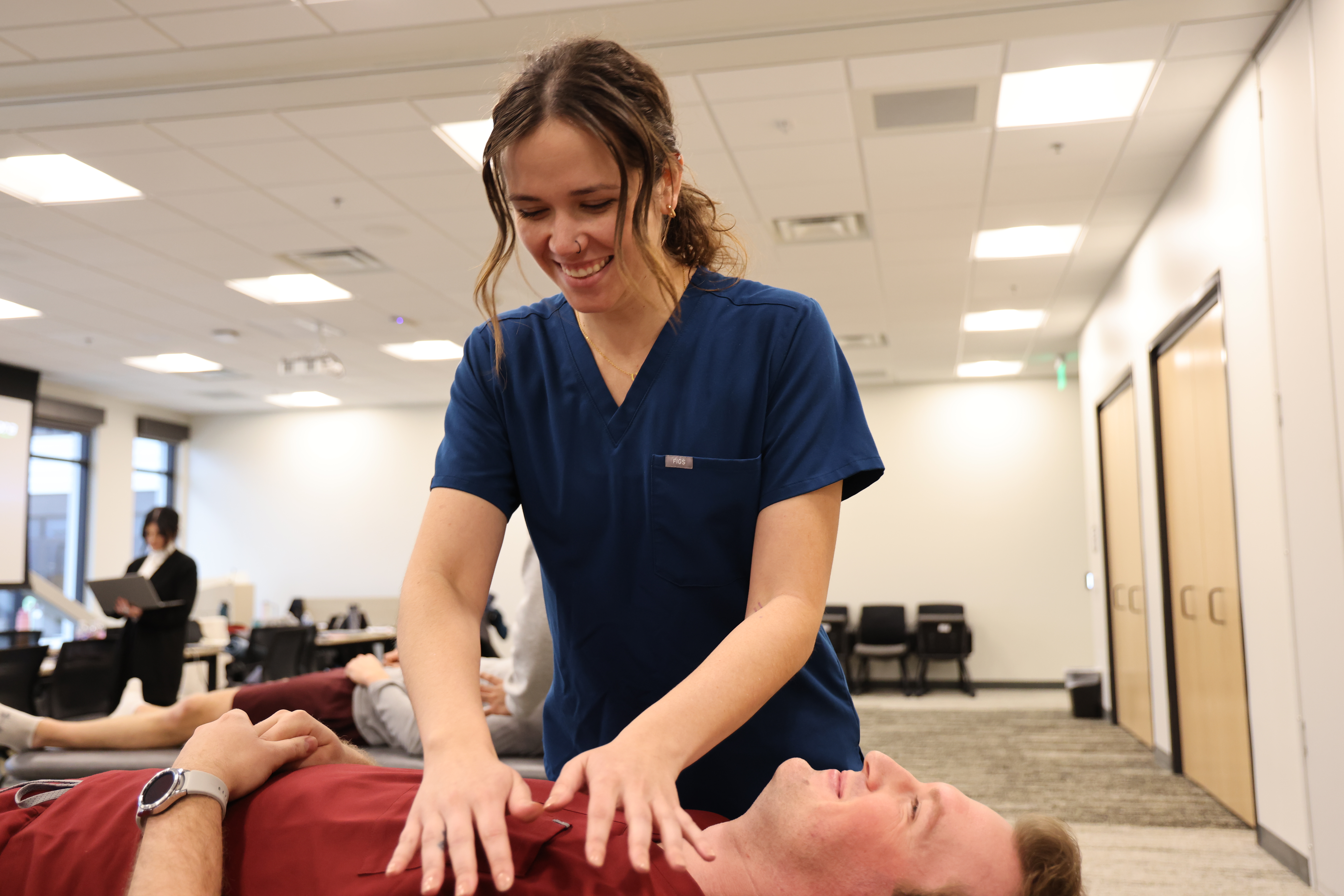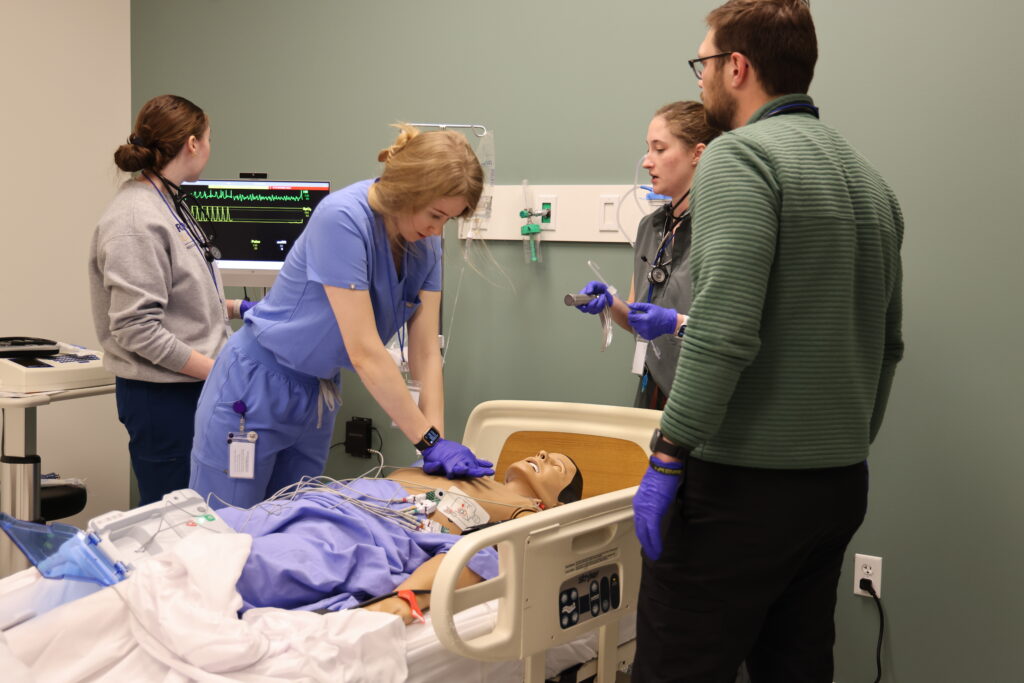
Enriching the Medical School Journey with C.A.R.E.S at RVU-MCOM
From interdisciplinary simulation to treatment under fire, C.A.R.E.S at our Montana campus is packed with hands-on training and opportunities that enrich our students’ educational experience.
What is C.A.R.E.S?
C.A.R.E.S stands for Clinical, Academic, Reflection, Enrichment, and Scholarship. This is when, four times an academic year, the curriculum breaks from system courses to focus on procedures, interdisciplinary care team simulation, tracks & electives, wellbeing, and research.
The weeks of Nov. 11-22 marked the sixth C.A.R.E.S block for the RVU Montana College of Osteopathic Medicine. Mornings were filled with simulation activities for both OMS I & II students and gave the opportunity for mentorship and collaboration between the classes. Students rotated between the Immersion Rooms and hospital bays for complex cases where they played the role of various medical team members. These simulations give student doctors perspective to help them soon be leaders of medical care teams.
In addition to simulation, these blocks offer programming in soft skills such as leadership development, career preparation, learning performance, and personal reflection. Many of these classes are put on by the expert team with Student Affairs. During the November 2024 block, Dean Dr. David Park led a Fundamentals of Leadership course. Dr. Carol Penn offered a special course in the ancient art of QiGong, tying its principles together with Osteopathic Manipulative Medicine.
Tracks & Electives
C.A.R.E.S offers dedicated time for Tracks & Electives courses. RVU-MCOM offers three tracks that give students the opportunity to take a deep dive into their areas of interest and to prepare for military service if they are commissioned through the HPSP program.
Military Medicine
The Military Medicine track offers students a unique opportunity to delve into the dynamic world of military healthcare. This specialized program provides an introduction to clinical scenarios commonly encountered by military medical officers while also preparing participants for residencies in military medicine. Alongside this, students gain valuable insights into the lifestyle, responsibilities, and expectations of serving as a Medical Corps Officer.
The program emphasizes hands-on, immersion-based training. Through Tactical Combat Casualty Care (TCCC), experiential reality-based scenarios, and field exercises, students are equipped to handle the challenges of disaster response, triage, and evacuation in combat environments. These experiences span land, sea, and air operations, reflecting the diverse settings military physicians must navigate.
Research Education Academic Leadership Medicine
The field of academic medicine is where clinical expertise intersects with research, education, and leadership. Academic medicine is more than just practicing clinical care—it’s about advancing the field through research, fostering the next generation of physicians as educators, and addressing systemic challenges in healthcare. Students in the academic medicine specialty track dive deep into these areas, exploring topics like organized medicine, health policy, diversity, and health disparities.
This program prepares students to be not only skilled clinicians but also influential leaders. Training focuses on building competencies as scholars, public speakers, educators, health advocates, and physician leaders. The ability to lead diverse teams, engage with communities, and build coalitions is essential to tackling contemporary health challenges effectively.

Global Rural Wilderness Underserved Tribal Medicine
The Global, Rural, Wilderness, Underserved, and Tribal (GRWUT) Track is designed to develop versatile medical students prepared to serve diverse communities and environments. Whether working in global health, rural clinics, wilderness settings, underserved neighborhoods, or tribal health systems, this program equips participants with the skills and perspectives needed to make a meaningful impact.
A cornerstone of the GRWUT Track is its emphasis on bidirectionality in global health. By learning from international healthcare innovations and applying those lessons to local challenges, particularly in Montana’s rural, underserved, wilderness, and tribal areas, students gain a comprehensive understanding of healthcare delivery in varied settings.
Participants learn to identify and address healthcare disparities and social determinants of health across a broad spectrum of populations. Through collaboration with expert physicians, educators, and guest speakers, students gain valuable insights into the complexities of delivering equitable care.
C.A.R.E.S and Wellbeing
RVU-MCOM employs evidence-based principles and lives the osteopathic teaching philosophies; C.A.R.E.S. is an innovative approach to incorporating these into the curriculum in a focused way. Wellness activities, dedicated time for reflection, and the opportunity to enrich their education with electives gives students a chance to dive into their own interests and use some of the time as needed to be ready for the next systems courses. These blocks are a huge undertaking by faculty and staff and offer incredible opportunities that students can carry with them throughout their careers as physicians.